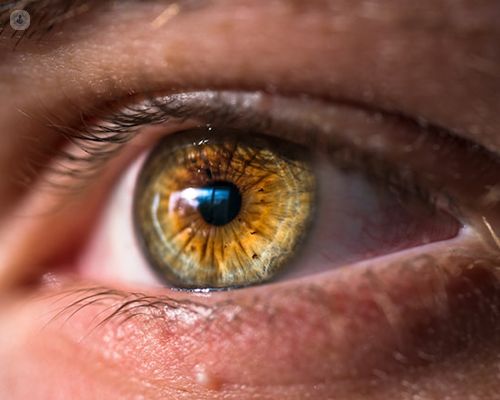Expert advice: Say goodbye to dry eyes
Autore:Dry eye syndrome can cause discomfort and unpleasant feelings of grittiness or stickiness in the eyes. In this informative article, revered consultant ophthalmologist Mr Geraint Williams reveals the causes of dry eye syndrome and details how testing is performed. The highly respected specialist also expertly explains how dry syndrome is treated and how problems of this type may relate to other medical conditions.

What is dry eye syndrome?
Dry eye syndrome is a group of diseases usually characterised by people having either a lack of tear production or that the tears that they make evaporate too quickly from the ocular surface, giving rise to symptoms and physical signs of dryness.
What symptoms do patients experience?
Patients can experience different symptoms, or even curiously, none at all. Most often, the symptoms associated with dry eye include grittiness and a sensation of foreign bodies in the eye, even if there's nothing there.
Also, the eyes can feel dry themselves or can sometimes become a little uncomfortable or sticky. All of these things can be symptoms of dry eye but assessment is required to determine this.
What are the causes of dry eye syndrome?
Broadly speaking, there are two main groups of dry eye diseases. Firstly, cases where tear production is insufficient are in fact less common, but can be associated with autoimmune conditions such as Sjogren’s syndrome.
More commonly, however, is evaporative dry eye caused by inflammation of the eyelids and disruption of the oil part of the tear film. The eyelids contain oily glands that help to coat the surface of the tears. If there is any disruption to this, which can be caused by conditions such as blepharitis, it can cause the tears to evaporate too quickly.
Less commonly, there can also be other environmental factors or drugs that people take for other conditions which can disrupt the tear film. In addition, performing surgery such as cataract surgery or laser refractive surgery may make dry eye worse.
How is dry eye syndrome tested?
Dry eye syndrome is usually tested through a combination of taking a history and examination. We use validated questionnaires to try and determine what impact it's having on the person's quality of life. We would also examine the patient to see evidence of dry eye through a microscope which helps us to determine both whether somebody has dry eye and the type of dry eye that they may have.
What forms of treatment are available to treat this condition?
Often there's no one cure for dry eye problems as such but instead we aim to establish what has caused the condition to develop and to find ways of managing it. I explain to all of my patients that this often requires some commitment on their part to undertake approaches to help with their dry eye. This may relate to lid hygiene and heat treatment, for example, to try to resolve blepharitis or other conditions which cause evaporative dry eye. This may be combined with substitution for tears in the form of non-preserved topical lubricants, known as dry eye drops.
We also recognise that dry eye problems are inflammatory and so may require specialist steroid drops or even long-term steroid sparing drops, such as topical Ciclosporin. These help to control the inflammatory component of dry eye which makes the condition very uncomfortable. The best form of treatment is determined during your assessment and consultation.
If you are seeking treatment from dry eye syndrome and wish to schedule a consultation with Mr Williams, you can do so by visiting his Top Doctors profile.


